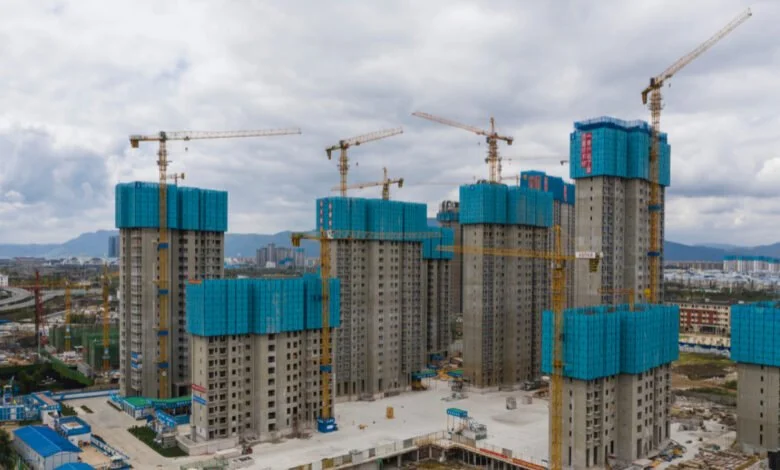- The cash flows of Chinese property developers went down this year after 10 years of growth.
- China didn’t get as much credit as expected in July, and developers are still having trouble.
- The People’s Bank of China has cut interest rates, which it hopes will help homebuyers and developers get loans.
BEIJING: The cash flows of Chinese property developers, which show how well the companies are doing, went down this year after growing steadily for the last ten years, says Oxford Economics.
An analysis by the firm’s lead economist, Tommy Wu, shows that developer cash flows through July are 24% lower than at the same time last year.
Since at least 2009, almost every year has seen growth. This is a big change from that. Annualized, the total funding as of July was 15.22 trillion yuan, which is about $2.27 trillion. In 2021, it will be 20.11 trillion yuan.
The drop is because China didn’t get as much credit as expected in July, and property developers are still having trouble.
About two years ago, Beijing started to stop developers from relying too much on debt to grow. Notably, Evergrande went bankrupt at the end of last year. Even though their balance sheets looked better, other developers, like Shimao, also went bankrupt.
Investors are now wary of Chinese real estate companies, and developers risk losing another important source of cash flow: prepayments from homebuyers.
In China, homes are usually sold before they are finished being built. But since the end of June, some homebuyers have stopped paying their mortgages to protest the slow building of apartments.
As Wu said in a report last week, “The heart of the problem is that property developers don’t have enough cash flows to keep working on projects. This could be because of high debt-service costs, low sales of homes, or improper use of funds.“
“Resolving this problem will rebuild homebuyers’ confidence in developers, which will help support housing sales and, in turn, improve developers’ financial health.”
Morgan Stanley’s analysis as of August 10 shows that more than $2 billion in high-yield debt from property developers is due in September. This is more than twice as much as was due in August.
In an August 15 report, a United States investment bank said that a proprietary AlphaWise Consumer Survey showed that about a quarter of people who bought homes before they were finished are likely to stop making mortgage payments if construction stops.
Analysts think that property and industries related to property make up more than a quarter of China’s GDP. This is because real estate makes up most of the people’s wealth in China.
This year, the overall growth of the economy has slowed down because of the real estate slump.
In order to help the economy grow, the People’s Bank of China has cut interest rates. On Monday, for example, 10 basis points were cut from some one-year interest rates for institutions, which was a surprise.
Even though the PBOC may hope that the cut will help homebuyers and developers get loans, Bruce Pang, chief economist and head of research for Greater China at JLL, said that the problem isn’t just about money.
He said that it’s harder for developers to get money on their own, so they have to rely more on pre-sales to people who want to buy homes. But people are becoming more hesitant to buy new homes because of their hopes for future jobs and returns on investments they already have, he said.
Despite claims of government plans to help developers, the central government hasn’t announced broader real estate support. A government meeting last month said that local governments are responsible for building finished homes.
Advance payments and deposits are down 34% this year, according to Wu’s data.
Credit as a funding source fell 22%, while self-raised capital, including stocks and bonds, fell 17%.
Investors stop buying China real estate
Most investment funds have avoided Chinese real estate developers, which has cut off a possible source of funding.
“What has been worrying has been the lack of willingness and speed by top policymakers in resolving real estate developer’s funding issues,” Carol Lye, assistant portfolio manager at Brandywine Global, told an international news agency in an email.
Lye said that the investment management firm has a small amount of money in Chinese real estate and that Brandywine holds “high-quality real estate bonds that have been given preference in terms of government support.”
Some investors have even turned to businesses in other parts of Asia.
“We’ve exited almost all of our holdings in China residential. It’s more a wait-and-see game in terms of getting back exposure,” said Xin Yan Low, portfolio manager for Asia property equities at Janus Henderson in Singapore. She wouldn’t say when those sales took place.
“There are still many alternatives in the region, especially with reopening now, Singapore, Australia, basically back to full reopening, fundamentals are strong,” she said.
Japan Metropolitan Fund Invest, Mapletree Logistics Trust, and Hang Lung Properties are top holdings in her fund.


